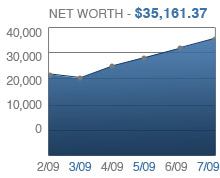"We have tried spending money. We are spending more than we have ever spent before and it does not work. And I have just one interest, and if I am wrong ... somebody else can have my job. I want to see this country prosperous. I want to see people get a job. I want to see people get enough to eat. We have never made good on our promises... I say after eight years of this Administration we have just as much unemployment as when we started... And an enormous debt to boot!"What I really enjoyed about the post was reading all the comments and seeing such a wide variety of thoughts on the subject. I think there will always be a debate about the great depression and I am pretty sure that there is going to be a lasting debate about this economic recession/depression.
Burton Folsom, Jr., New Deal or Raw Deal? (New York: Simon & Schuster, 2008)
One of the comments that I found the most interesting was the last commentator Michael Smith. My personal beliefs are somewhere around his ideas:
I think the reader make a very strong case in his last paragraph, that everyone is quick to blame the last administration (and look, as they should) for getting us into this mess. As Peter Schiff says that the old administration is driving us towards a cliff and all the new one is doing is steeping on the gas. I know it is more complicated than this, but overall government spending is just not the answer to this situation."Government spending will not “stimulate” the economy for the simple reason that all government spending is ultimately done at the expense of private spending. To spend, government must either 1) take money directly from the people in taxes, or 2) borrow the money from the people, or 3) print the money up.
If government spends a dollar that it got by taxation, that is simply a dollar spent by government that was not spent by the taxpayer. Likewise, if government spends a dollar it borrowed from the citizens, that is simply another dollar the citizens don’t have to spend. And if government spends a dollar that it printed up, that simply reduces the value of all the citizen’s dollars proportionally. But in no case has government created new, additional purchasing power that can drive new, additional economic activity.
Government spending can divert production (and consequently employment) from one area to another. But it will not, in aggregate, increase production or employment.
Look, if government spending/action were the key to economic growth, we should be experiencing full employment and record economic growth, because the Bush administration has increased government spending by over 1 trillion dollars a year. An increase of a TRILLION dollars per year. Yet, here we are sliding into a recession."
Only time will tell and I am sure that 70-80 years from now we will still be debating this...let's just hope we are not talking about the second great depression by the Bush and Obama administrations instead of the Hoover and Roosevelt.
These are the opinions of our founding fathers and myself that call for limited government. What do you think? Are we headed to recovery or to depression? How is this administration doing? Leave me a comment.











I know enough to know that I don't know enough to really make an intelligent comment on the matter.. LOL
ReplyDeleteBut, I will say that the government does have to spend a certain amount of money to make people happy. How much that is, and who is ultimately happy depends on a lot of things. But the one sure thing, is that our government has created a lot of programs over the years, that millions of people now depend on to exist. I imagine it would take a tremendous effort to turn this ship around.
Well, based on my estimates, I don't think we're yet onto a *real* recovery (we need to see the summer earnings still, for one). What we just saw in the markets was the result of many kinds of optimism setting in, but it seems now we're finally hitting some correction that was going to come, of course.
ReplyDeleteAlthough I know where you're coming from re: Austrian economic perspective, etc., it feels as though we're already off the cliff, so that advice can't work - Bush should have followed it long ago. Honestly the only thing that looks plausible now is some kind of imperceptible global superinflation - where the US will be exporting its mega inflation to the rest of the world. It's great that some of the bailouts are being paid back, but nothing tells me the Fed will do anything to pull in all the liquidity it created 5 or 10 years from now.
That's my soundbyte version:)